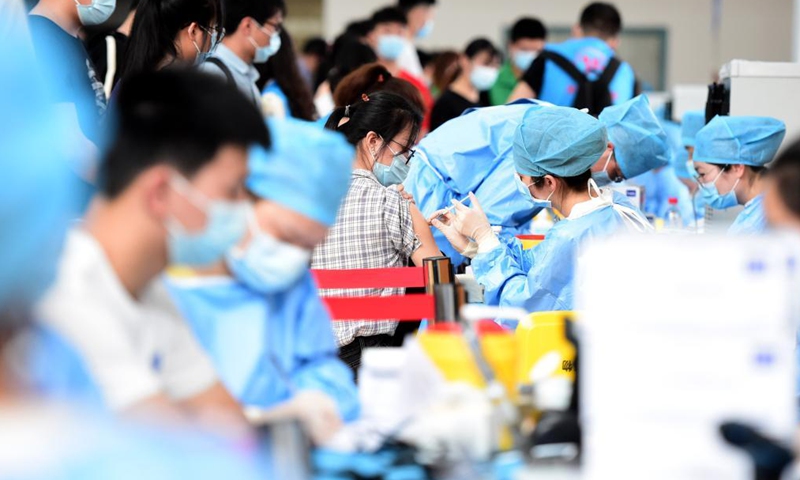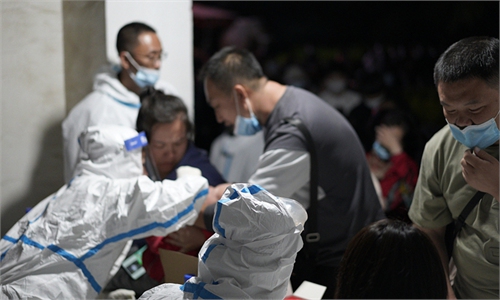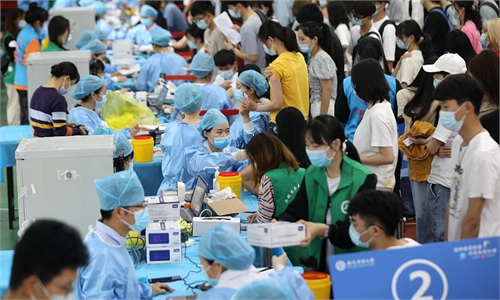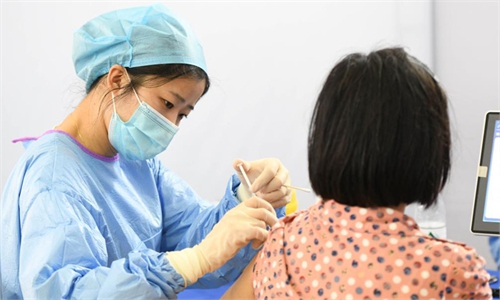China’s new outbreak may originate from port city; full measures taken to prevent virus spread
Sporadic cases of COVID-19 may originate from NE port city: CDC expert

Faculty members and students receive COVID-19 vaccines at a vaccination site at Anhui Agricultural University in Hefei, east China's Anhui Province, May 13, 2021.Photo:Xinhua
Yingkou, Northeast China's Liaoning Province is in the spotlight as epidemiologists believe that the recent resurgence of sporadic COVID-19 cases may have originated from the port city, which has imposed strict traffic control and anti-epidemic measures to prevent COVID-19 from spreading.
The latest outbreaks were in two provinces - Liaoning and East China's Anhui - that had reported 16 confirmed and 13 asymptomatic carriers as of press time.
Epidemiological studies showed the travel histories of the confirmed cases and their close contacts were linked to at least six provinces and cities, including Beijing.
China has not seen such clustered cases in multiple places since the previous regional outbreak, concentrated in the country's northern areas, ended in February.
Although the city of Lu'an in Anhui Province reported a confirmed case first, the time of onset for the Yingkou cases in Liaoning was earlier, Wu Zunyou, chief epidemiologist at the Chinese Center for Disease Control and Prevention (CDC), told the media on Saturday.
"As an inland province, the possibility that Anhui's resurgence resulted from imported cases is low. But Liaoning, the province where Yingkou is located, had reported several domestic outbreaks triggered by imported cases," Wu said.
Wang Peiyu, a deputy head of Peking University's School of Public Health, told the Global Times on Sunday that Yingkou is a major port for cargo in Northeast China, so it's more likely to see the virus being imported via people or objects from abroad.
Yingkou Port has container shipping lines and does business with 130 ports in more than 40 countries and regions including Japan, South Korea and the Hong Kong Special Administrative Region. It also has a cold-chain transportation special line to Jilin Province.
Yingkou did not lock down the city, but two railway stations in the city only allow travelers who hold certificates of negative nucleic acid tests within 72 hours to enter.
Among the 16 confirmed and 13 asymptomatic carriers reported by Liaoning and Anhui, at least 28 had direct or indirect links with a photography studio located in the Bayuquan district of Yingkou.
To prevent cross-infection and the spread of the disease, the Bayuquan district has temporarily closed all private clinics starting from Sunday. Lü, a patient who was confirmed in Anhui Province, was on a drip four times at a private clinic in the Bayuquan district 10 days before going to Hefei on a train via Beijing.
Wang said the diagnosis and testing ability of clinics and other grass-roots medical institutions in China's small cities or townships need improvement, as cases where COVID-19 patients were treated as having normal colds by clinic doctors also happened in the previous clusters in North China's Hebei Province in December 2020.
Primary and middle schools in Bayuquan were also asked to seal off their campuses and suspend classes on Sunday. Students from the first and second years of high school will take online courses, and students and teachers who are preparing for the national college entrance exams will all study and live at their schools, local education authorities said.
While local authorities take measures to prevent cases from further spreading, Bayuquan is running a second round of mass nucleic acid tests to screen out more potential patients. China's National Health Commission said it has sent a working group to Liaoning to guide the prevention and control work.
The Bayuquan district is famous for producing mackerel. Yingkou, as a city home to seafood production and processing bases, should determine whether this outbreak may be related to imported cases or items as quickly as possible, experts said.
The district also experienced a travel peak during Labor Day holidays, with more than 970,000 trips made to the district.
Zhang Wenhong, China's leading infectious disease expert, said on a social media post on Sunday that the outbreaks will keep happening as the risk of imported infections will not diminish with the gradual opening up of international exchanges.
"Based on the global situation, the novel coronavirus has become a permanent virus, and we must prepare for a long-term response to it," he said, encouraging the public to get vaccinated for self-protection.




